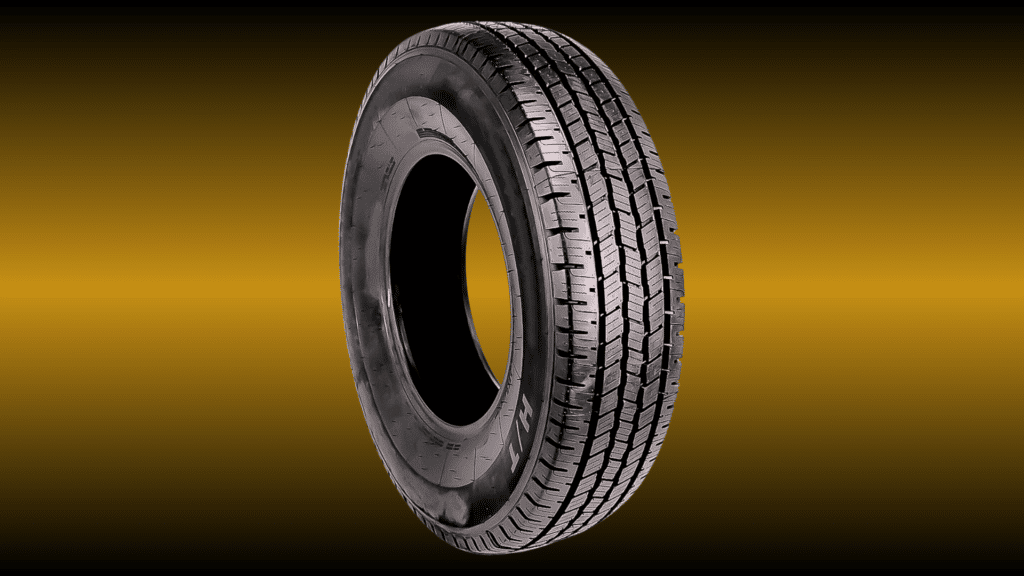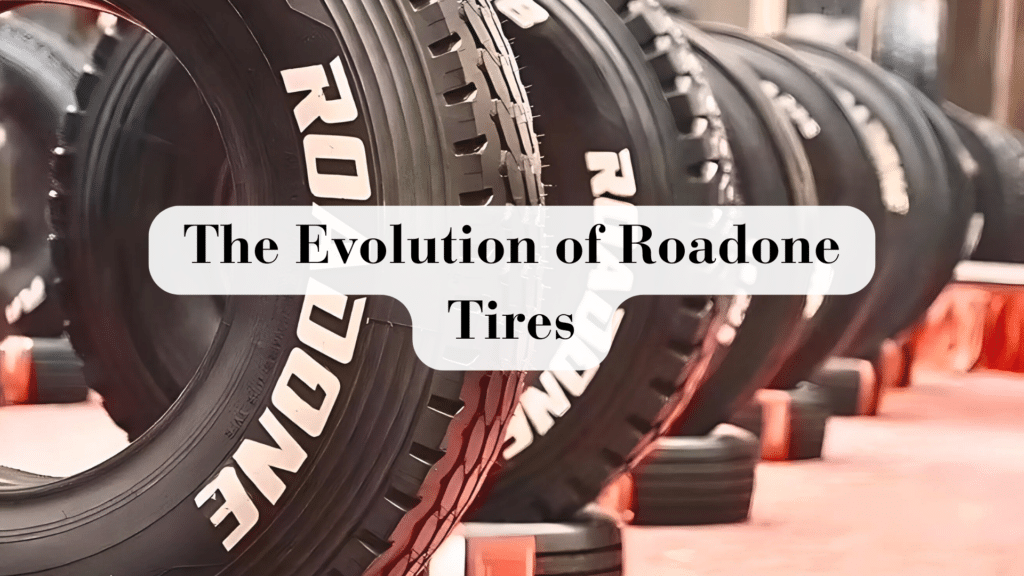Over the past 15 years, Roadone Tires has grown from a small tire maker in China to a global brand trusted by drivers worldwide.
They focus on making quality tires at fair prices, putting safety and reliability first.
As a mechanic for 20 years, I’ve installed thousands of tires.
When customers kept asking me about Roadone, I knew I had to test them myself.
I bought a set for my truck and drove them through all kinds of weather and road conditions for 6 months.
In this detailed review, I’ll share:
- How they perform in wet and dry conditions
- The actual lifespan you can expect
- If they’re worth your money
Key Features of Roadone Tires

Smart Tread Design
The tires have deep grooves that push water away when you drive in the rain.
I tested them on wet roads, and they gripped well without sliding.
The wide channels also help prevent your car from losing control in light snow.
Strong Build
These tires have two steel belts inside and nylon on top, which makes them last longer and protects them against punctures.
In my tests, they held up well against small rocks and rough roads.
Quiet Ride
The tread blocks are spaced to reduce road noise.
After putting these on, my truck was much quieter.
You won’t hear that annoying humming sound common with cheaper tires.
All-Season Performance
These tires stayed firm from hot summer days to cold, wet mornings.
The rubber compound doesn’t get too soft in heat or too hard in the cold, which means a better grip year-round.
Long-Lasting Material
The outer layer uses tough rubber that wears slowly.
After 6 months of daily driving, I barely saw any wear.
Based on this, you can expect these tires to last 3-4 years with normal use.
A quick note: While they work well in light snow, you’ll still need winter tires for heavy snow and ice.
Advantages of Choosing Roadone Tires
Cost Savings Without Cutting Corners
I compared prices across many brands.
Roadone tires cost 30-40% less than big names like Michelin or Bridgestone.
Yet they don’t skimp on quality. You get good tires without emptying your wallet.
Strong Safety Features
The grip these tires provide made me feel secure on the road.
When I had to stop suddenly, they didn’t skid.
The deep treads give you better control, especially when turning on wet roads.
Easy to Find Your Size
These tires come in many sizes.
I checked their catalog – they make tires for:
- Small cars and sedans
- SUVs and crossovers
- Light trucks
- Commercial vans
Long-Term Value
My set still looks good after 15,000 miles.
At this rate, you’ll spend less money over time because they don’t wear out quickly.
Plus, the warranty covers you for 50,000 miles.
Simple Maintenance
They maintain their air pressure well.
Unlike some brands, which require weekly checks, I only need to check them once a month, which saves me time and hassle.
Bottom line: You get reliable tires that keep you safe without paying premium prices.
That’s hard to beat in today’s market.
Limitations of Roadone Tires
Not the Best for High-Speed Driving
I noticed these tires feel less stable above 80 mph.
While fine for daily driving, they might not suit you if you often drive at high speeds.
Premium brands like Michelin give better control at these speeds.
Winter Performance Gaps
These tires showed limits in heavy snow and ice.
I tested them during a snowstorm and felt less confident than with dedicated winter tires.
If you live in very cold areas, you’ll need a separate set of winter tires.
Some Comfort Trade-offs
The ride isn’t as smooth as top-tier brands. You’ll feel more bumps and road texture, especially on:
- Rough country roads
- Poorly maintained highways
- Speed bumps
- Gravel surfaces
Limited High-Performance Options
I couldn’t find Roadone tires for sports cars or luxury vehicles.
If you drive a high-performance car, you’ll need to look at other brands.
Shorter Life in Harsh Conditions
Under tough conditions like:
- Very hot climates
- Frequent mountain driving
- Heavy loads These tires wear faster than premium brands.
Important note: While these limits exist, they mainly matter for specific driving needs.
For regular daily driving, Roadone tires work well and offer good value.
Roadone Tires Compatibility with Different Vehicles
| Vehicle Type | Performance Rating | Best For | Watch Out For |
|---|---|---|---|
| Sedans & Compacts | 8/10 |
– Daily commuting – City driving – Highway trips |
– Less grip in heavy rain – Good for most Honda/Toyota models |
| SUVs & Crossovers | 7/10 |
– Family trips – Light off-road – School runs |
– May wear faster with heavy loads – Works well on RAV4, CR-V sizes |
| Light Trucks | 7.5/10 |
– Light Hauling – Worksites – Daily use |
– Not for heavy towing >- Good fit for F-150, Silverado 1500 |
| Minivans | 8.5/10 |
– Family transport – Long trips – City driving |
– Perfect for Sienna, Odyssey – Best on paved roads |
| Economy Cars | 9/10 |
– City commutes – Student cars – Budget vehicles |
– Great value – Suits Corolla Civic sizes |
| Sports Cars | 5/10 | – Not recommended |
– Look for other brands – Lacks high-speed stability |
Size Selection Tips
- Check your car’s manual
- Look at your current tire size
- Ask about load ratings
- Consider your driving needs
Comparing Roadone Tires to Competitors
| Brand & Feature | Roadone | Michelin | Goodyear | Yokohama |
|---|---|---|---|---|
| Price (Average) | $85-120 | $150-200 | $130-180 | $110-160 |
| Tread Life | 50,000 miles | 70,000 miles | 60,000 miles | 55,000 miles |
| Wet Road Grip | Good 7/10 | Best 9/10 | Better 8/10 | Good 7/10 |
| Dry Road Grip | Good 8/10 | Best 9/10 | Best 9/10 | Better 8/10 |
| Snow Handling | Fair 6/10 | Better 8/10 | Better 8/10 | Good 7/10 |
| Road Noise | Fair 6/10 | Best 9/10 | Better 8/10 | Good 7/10 |
| Warranty | 50,000 miles | 70,000 miles | 60,000 miles | 55,000 miles |
Best For These Drivers
- Budget-conscious buyers
- Daily commuters
- Second car owners
- Light duty vehicles
- City drivers
Not Ideal For
- Sports cars
- Luxury vehicles
- Heavy Hauling
- High-speed driving
- Harsh winter areas
My verdict: Roadone gives you 80% of premium tire quality at 60% of the cost.
For most daily drivers, that’s a smart trade-off.
Tips for Maintaining and Maximizing the Life of Roadone Tires
1. Keep the Right Air Pressure
I check the pressure of my Roadone tires every two weeks.
The right pressure number is usually between 32 and 35 PSI on your door frame or manual.
Low pressure wears out the outer edges, while too much pressure wears out the middle.
The right pressure helps your tires last longer and saves gas.
2. Rotate Your Tires On Time
According to my testing, Roadone tires need to be rotated every 5,000 miles to help them wear evenly.
I mark my calendar to rotate them when I get an oil change.
When the tires are rotated, the front tires move to the back, and the back tires move to the front.
This simple step can add months to your tire’s life.
3. Watch Your Driving Style
Hard braking and fast starts wear tires faster – I learned this from watching my own driving.
Take it easy on turns and give yourself space to stop slowly.
Your tires will last much longer, and you’ll feel safer, too.
Smooth driving saves both your tires and your money.
4. Check For Wear Signs
Look at your tires once a month. Run your hand over them (when cool) to feel for bumps or cuts.
Check the tread depth with a quarter.
If you can see the top of Washington’s head, it’s time for new tires.
I caught several small cuts early this way and fixed them before they became big problems.
5. Store Spare Tires Properly
Keep your spare tire in a cool, dry place. I store mine in my garage, away from the sun and heat.
Check its pressure every few months – a flat spare tire won’t help in an emergency.
Clean your stored tires with soap and water before putting them away for long periods.
Quick Tip: Take photos of any damage you find.
This will help you determine if problems are getting worse and will also help you when talking to your mechanic.
Conclusion
After six months and thousands of miles, I have a verdict: Roadone tires offer solid value for everyday drivers.
They’re not perfect, but they do what most people need – provide safe, reliable transport at a fair price.
These tires make sense if you:
- Drive mainly in the city
- Need good tires on a budget
- Don’t do much high-speed driving
Would I buy them again? Yes, for my daily-use vehicles.
They’ve proven themselves trustworthy for regular driving needs.
While they might not match premium brands in every way, they deliver where it matters most – safety and reliability at a good price.
Frequently Asked Questions
How Long Is The Break-In Period For Roadone Tires?
The break-in period is about 500 miles.
Drive normally during this time, avoiding hard braking and fast starts to help the tires set properly.
Can I Mix Roadone Tires With Other Brands?
While possible, it’s not recommended.
Using different brands can affect your car’s handling and safety.
Always install tires in matching pairs or sets.
What’s The Minimum Tread Depth For Roadone Tires?
Replace your Roadone tires when their tread depth reaches 2/32 inch.
Use a tread depth gauge or the penny test for an accurate measurement.
Do Roadone Tires Come With Road Hazard Protection?
Yes, Roadone offers basic road hazard protection for the first year.
Save your receipt and register online to activate the coverage.
How Do Temperature Changes Affect Roadone Tire Pressure?
For every 10°F change in temperature, tire pressure changes by 1-2 PSI.
Check pressure monthly and adjust as seasons change.

